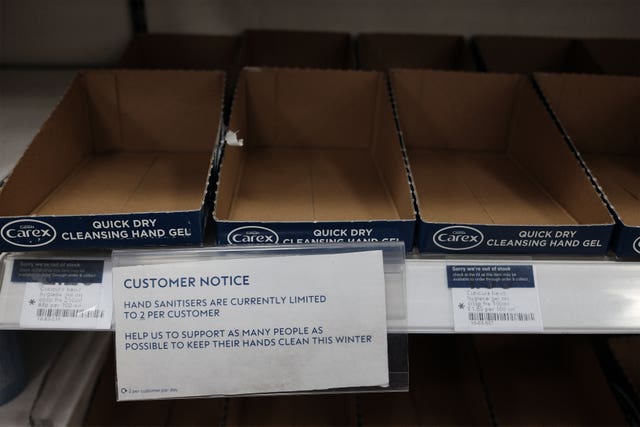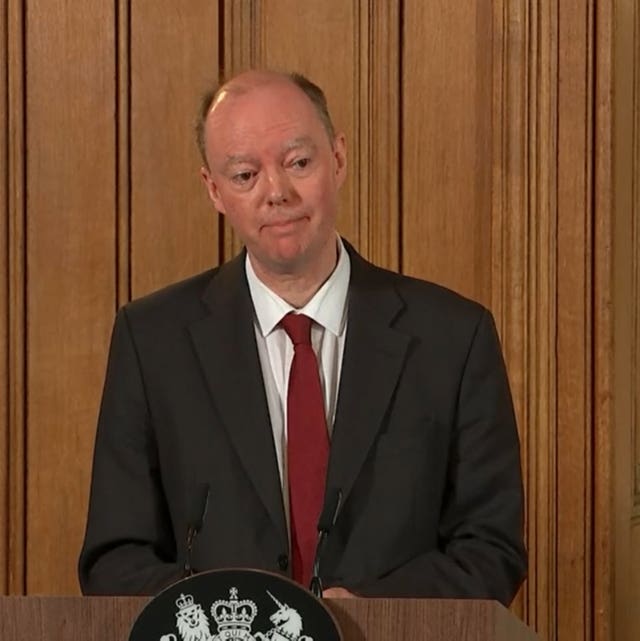Coronavirus: Health Secretary says Government ‘will ensure food supplies’
On Thursday evening, an older patient, reported to be a woman in her 70s, became the first person in the UK to die after being diagnosed.

The Government is working with supermarkets to ensure food supplies as the number of people self-isolating with coronavirus is expected to rise, the Health Secretary has said.
Matt Hancock sought to reassure the public following panic-buying in some areas, with supermarkets seeing their shelves cleared of essentials such as toilet roll and paracetamol.
It comes as an older patient, reported to be a woman in her 70s, became the first person in the UK to die after being diagnosed with coronavirus.
Speaking on BBC’s Question Time, Mr Hancock said: “The Government has supplies of the key things that are needed, and, within the food supply, we are absolutely confident that there won’t be a problem there.
“And, crucially, we are working to makes sure that if people are self isolating, they will be able to get the food and supplies that they need.”
He said there was “absolutely no need” for individual people “to go round buying more than they need.”

Downing Street said the Department for Environment, Food and Rural Affairs (Defra) had regular meetings with the food industry to discuss risks to the supply chain, with a working group due to meet on Friday.
One supermarket executive told the BBC sales of basics such as pasta and tinned goods had “gone through the roof”, adding: “While I think people don’t need to panic buy and should just shop normally, I’m not sure the Government can guarantee all food supply in all instances.”
New blog posts from Public Health England (PHE) suggested people may need to get supplies for loved ones in future if social-distancing measures are brought in and more people are told to stay at home.
The posts urged people to “plan ahead”, adding: “Everyone has a part to play, and we’re asking people to think about what they do in a typical week, how they could limit contact with others if asked to, and how they could help people in their community, who might need support if certain social-distancing measures were put in place.
“This might include helping older relatives and neighbours to get some food in, so that they would have supplies for a week or so if required, ensuring someone would be available to go shopping for them, or arranging for online delivery if they needed it.”

Meanwhile, 142 people from the UK – including 121 passengers and 21 crew – are among 3,533 people on the Grand Princess cruise ship currently quarantined off the coast of California.
Princess Cruises said it was following advice from the US Centres for Disease Control and Prevention (CDC) and samples were collected on Thursday from 45 people deemed to be at risk.
It said in a statement: “Following guidelines received from the CDC, all guests have been asked to stay in their staterooms while test results are pending.
“Guests are receiving meal deliveries in their staterooms by room service, and additional television and movie options have been added to in-room programming.”
The cruise ship made a round trip from San Francisco to Mexico last month, after which a cluster of coronavirus cases were identified.
After the liner docked in San Francisco on February 21, thousands of passengers disembarked and thousands boarded. The vessel then sailed to Hawaii.
Meanwhile, a 43-year-old British businessman has been confirmed with Covid-19 in Thailand, and the Vatican confirmed its first case.
A church in Devon has also closed after a parishioner was diagnosed with coronavirus, and the Bhaktivedanta Manor Hare Krishna temple, near Watford, closed its doors after a member tested positive.
Two members of British Airways staff also tested positive. PA understands the staff are baggage handlers.
Globally, the number of coronavirus cases has passed 100,000, with 3,400 deaths.

Prime Minister Boris Johnson visited a Bedfordshire laboratory as the Government pledged an extra £46 million for research into a vaccine and rapid diagnostic tests.
On Thursday evening, the Royal Berkshire Hospital in Reading said the older patient who died had been “in and out of hospital” for other reasons but was admitted on Wednesday evening and tested positive.
It came during a day of several key developments, with the number of UK cases of Covid-19 surging to 116 – more than double the total 48 hours earlier.
Health chiefs also said people diagnosed with coronavirus who show only “very minimal” symptoms should self-isolate at home rather than in hospital, while new advice was issued to travellers returning to the UK from anywhere in Italy that they should self-isolate if they develop symptoms.
Last week, a British tourist who had been on board the Diamond Princess cruise ship, which was quarantined in Japan, became the first UK citizen to die from the virus.

At a press conference on Thursday evening, Prof Whitty revealed that 18 people have so far recovered from coronavirus in the UK and 45 are being treated at home.
He had earlier warned that critical care beds in the NHS could come under intense pressure during a coronavirus epidemic, and told MPs the UK had mainly moved to the delay stage of tackling the virus.
This could include measures such as school closures, encouraging greater home working, and reducing the number of large-scale gatherings.

But the PM stressed it was important not to “fire your shots too early” in escalating measures to tackle the illness.
Prof Whitty has said half of all coronavirus cases in the UK are most likely to occur in just a three-week period, with 95% of them over a nine-week period.





